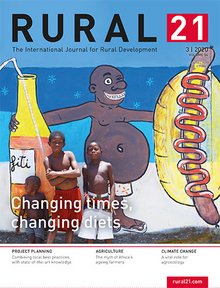Vol. 54 No. 3/2020: Changing times, changing diets

In its 2019 publication Food in the Anthropocene, the EAT-Lancet Commission described the link between nutritional targets and environmental sustainability. In brief, the study argues that diets and food production will need to change in order to improve health and avoid damage to the planet, emphasising that people will have to eat more fruit, vegetables, nuts and seeds, legumes and whole grains while reducing the consumption of ruminant meat in particular. Setting out from this, the authors presented a proposition for a global reference diet.
Whereas it is undisputed that the recommendations of the Lancet Commission point in the right direction, the question remains how the world population can be urged to take precisely this course. For the recommendations raise a number of tricky issues, which our authors have taken a closer look at. They show what level of knowledge we are at and where there is a need for further research. They give examples of how the negative effects of changing consumption patterns can be addressed by multi-sectoral and multi-stakeholder action, but also of the new opportunities that changing dietary habits offer farmers and agripreneurs. And they highlight how traditional but frequently underutilised and undervalued food can contribute to tackling the nutritional problems of the modern world.
Click here if you are interested to subscribe
Download edition 2020/03 Focus: "Changing times, changing diets" as PDF
Focus
- Changing times, changing diets
- Healthy diets – a privilege of the rich?
- Towards sustainable diets and planetary health: lessons from early research and knowledge gaps
- Tackling the double burden of malnutrition
- "Reducing malnutrition levels calls for concerted efforts"
- Civil society’s engagement for better nutrition – the case of Namibia
- Helping ‘local favourites’ join the race for healthier diets
- Insects for dinner?
- Small fish with a big potential
- The trend towards healthy diets – an opportunity for farmers and agri-entrepreneurs
- Nutrition and health: farming women in Kenya’s Murang’a speak out



